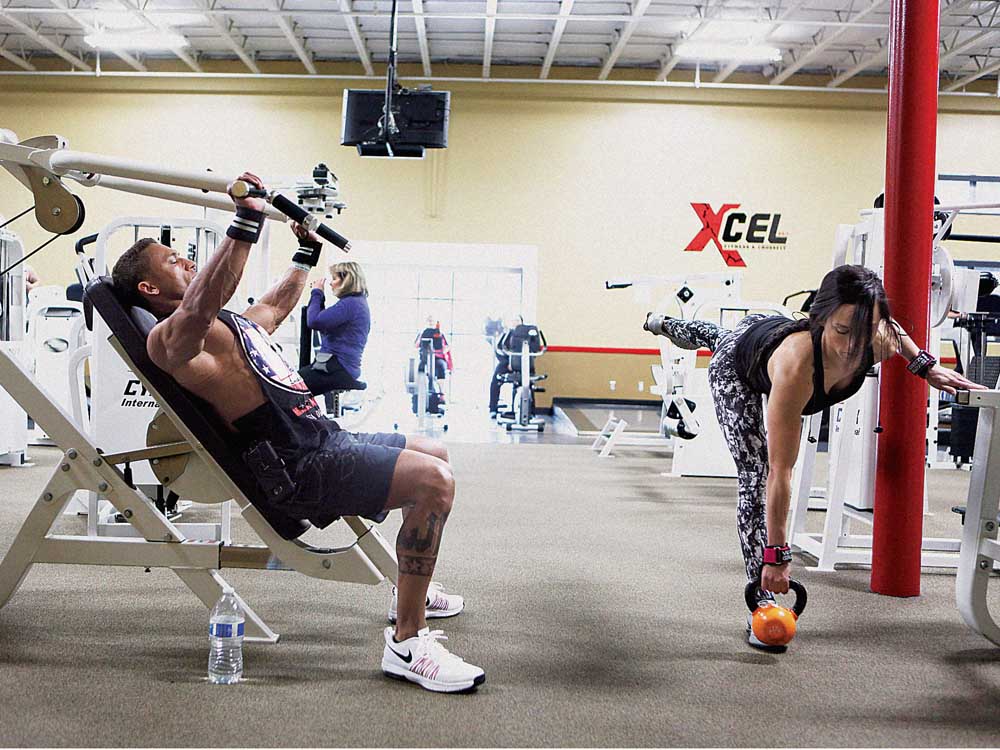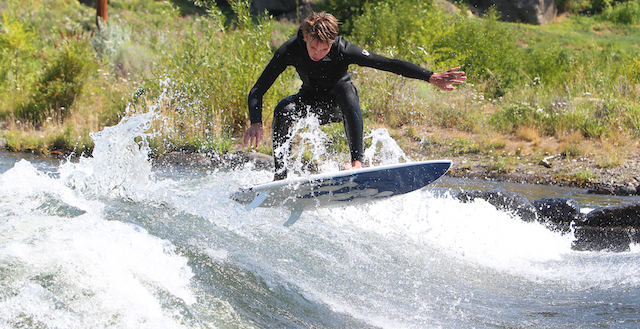Bend bodybuilders prep for competition
Published 12:00 am Thursday, May 5, 2016

- Jarod Opperman / The BulletinJayson Mitchell, left, and his wife, Evelyn Mitchell, work out at Xcel Fitness in Bend in preparation for a body building competition.
In the weeks leading up to a bodybuilding competition, Jayson Mitchell starts to feel crazy watching his friends drink beer and wine and eat spaghetti — all things he can’t have.
“But they don’t have the trophies up on their mantel saying they won first place at a show for looking phenomenal,” he said, “so it’s a give and take.”
These days, Mitchell is restricting himself to 1,800 calories daily, despite the fact he’s in the gym for at least an hour and a half five days a week. The 37-year-old Bend native is down to 165 pounds — 15 pounds lighter than he was two months ago.
On May 28, hundreds of competitors from across the Northwest — some from across the country — will gather at the Riverhouse convention center in Bend for the NPC Cascadian Classic, an annual bodybuilding competition that draws rookies and seasoned veterans alike.
Mitchell is among about 30 local bodybuilders who will participate in the competition. For them, this is prime “prep time.” They’ve spent months building huge, muscular physiques and now — eight to 20 weeks before a competition — they’re slashing calories in an effort to drop as much body fat as quickly as possible. But that doesn’t mean they’re skipping the gym — some are hitting it even harder.
“It takes some serious dedication to do what we do,” Mitchell said. “I think people are just scared of that kind of commitment.”
On competition day, nothing — not how much muscle you have, nor how good you look — matters if you’re not lean, said Wes Conner, a 31-year-old Bend resident who has been a competitive bodybuilder since age 18. And not just beach body lean, stage lean, which is “very, very lean,” he said.
Losing those last 3 or 4 pounds is horrible, Conner said. That’s when he said he gets extremely tired but has to keep pushing harder.
“Your body almost starts to shut down like it knows something is wrong because of how lean you’re getting,” he said. “The trick then is you just keep lifting and doing more cardio.”
‘A lot of pros and negatives’
The daily amount of calories a person’s body requires depends on their age, height, weight, gender and physical activity level. In general, a 40-year-old man needs between 2,200 and 3,000 calories — less if he’s sedentary — according to the Center for Nutrition Policy and Promotion, a division of the U.S. Department of Agriculture. A 40-year-old woman needs between 1,800 and 2,200 calories per day.
In interviews, female competitors described going as low as 1,300 calories per day while working out almost daily.
Pete McCall, a San Diego-based certified personal trainer and spokesman for the American Council on Exercise, said those numbers are concerning and potentially dangerous if they’re sustained for long periods of time. Simply put, bodies need a certain amount of body fat to function properly, he said. Men need at least 3 to 4 percent body fat and women need at least 7 or 8 percent.
“When your body fat is too low, your body doesn’t metabolize things correctly; your organs aren’t going to function properly,” McCall said. “It really can be very dangerous to sustain for an extended period of time.”
Bodies also need calories for energy. Doing high-intensity exercise without enough fuel can lead to a condition called gluconeogenesis, McCall said. That’s when the body has burned through its available carbohydrate and uses protein for fuel rather than carbohydrates and fat. That means that protein won’t be available to help repair muscle tissue after exercise.
Francesca Lauren, a 34-year-old International Federation of Bodybuilding and Fitness pro who lives in Portland, said she doesn’t think calories are a useful indicator of how much sustenance someone is taking in. Instead, she pays close attention to proteins, carbohydrates and fats. During prep time, her caloric intake can get as low as 1,200 calories, but she also consumes about 200 grams of protein each day.
“A lot of people think we starve ourselves,” Lauren said. “We absolutely, most definitely do not. I eat every 2 to 3 hours.”
All of the competitors interviewed for this article say they’re dropping body fat in a healthy, sustainable way. At the same time, they acknowledge that others participating in the sport may not be.
“The more uneducated you are, the scarier it is,” Mitchell said.
Whether it’s starving oneself or using supplements that could harm one’s liver, there are lots of ways training for a competition can go wrong, he said.
Anna Limbeck, a 32-year-old Bend resident who has participated in competitions since 2012, cautioned that anyone starting out in bodybuilding should do so under the watchful eye of a well-educated coach.
“There is a lot of pros and negatives of competing, to be totally honest,” said Limbeck, who’s taking a break from competing to spend more time with her family. “We do see some girls who come in doing some things that they shouldn’t be. Their calories are too low and it isn’t necessarily such a great experience.”
Shortly before a show, competitors will do what’s commonly referred to as “water dumping.” They’ll stop drinking water and consuming sodium — which makes the body retain water — in an effort to lose any remaining water weight. The practice also makes muscles look more defined.
“On stage I won’t have any water in me, so I’ll look completely shrink wrapped,” Mitchell said, “and it will show off all my muscle. I’m like zero body fat, no water and my skin will be super thin.”
‘You learn your body’
Needless to say, muscles aren’t built during prep season. That’s bulk season, when bodybuilders take in way more calories as they lift heavier and try to get as big as possible.
Bulk season means sacrificing the coveted leanness of prep season in order to facilitate growth, Conner said.
“Some people take that to the extreme, though, and they get pretty big,” he said, “and then they have to diet much harder.”
Competitors described cardiovascular exercise like running or biking as more of an afterthought. Some said they do about 20 minutes two or three times a week just to loosen the joints and get the blood flowing.
A self-described “foodie,” Mitchell said his calories can get as high as 5,000 per day during bulk season. He hits the gym just as hard as during prep season, but he’s using heavier weights and doing fewer reps in order to grow muscle. During prep season, he’ll do more reps with lighter weights, which he said adds definition to the muscles he built during bulk season.
Ask bodybuilders what they eat, and the first thing on the list is usually the same: chicken. When you’re building muscle, protein is like fuel for a car. They like chicken because it delivers a lot of protein without a lot of fat. White fish is another one. Ground turkey or very lean beef. Egg whites.
Sweet potatoes, oatmeal, quinoa and brown rice are staple carbohydrates in many a competitor’s diet. Fat comes from things like avocados, olive oil, almonds, coconut oil and peanut butter — and the small amount of fat that comes from the meat.
Mitchell’s wife is also a bodybuilder; the couple adheres to a strict, low-fat diet. They track every ounce of fat, carbohydrate and protein using the online tool MyFitnessPal. He tries to say under 40 grams per day. At first, he said cutting that much fat can make a person feel lethargic and dizzy.
“Because your brain runs off of fat,” he said. “So you almost have to retrain your brain to live off of less fat.”
The bottom line is, everyone is going to be a little different with respect to the combination of proteins, fats and carbs that work for them, Limbeck said.
“There is not a set, specific plan that everybody can use,” she said. “I do really well with higher carbs, lower fats. Other people do better on higher fats, lower carbs. As you go through this lifestyle, this competition, you learn your body.”
‘Not seeing the diet and exercise’
Although Limbeck said she’s a proponent of getting most of her nutrition from foods, she — like almost all competitors — uses protein powder. She also takes branched-chain amino acids and glutamine, products used to support muscle recovery and improve muscle growth.
During prep time, Limbeck said she turns to preworkout supplements. These combine ingredients like caffeine, amino acids and creatine, and are taken before a workout to boost energy.
“Especially closer to a show, our energy is down because we’re trying to lose and get our body fats lower,” she said. “I rely on preworkout and stuff like that.”
Lauren, the pro from Portland, said her goal is to get all her nutrition from food. She doesn’t use protein powder (she’s allergic to whey), but she does use preworkouts before a show and, more rarely, BCAAs.
“Supplements are supposed to just really help you out in those pinch times,” she said.
Competitors said they think people who don’t understand bodybuilding mistakenly believe they use more supplements than they really do. If someone sees a competitor using a supplement, they think that person’s huge muscles came from using the supplement, when the product probably didn’t have a significant impact.
“They’re not seeing the diet and exercise,” Limbeck said.
In very rare cases, consuming too much protein combined with high-intensity exercise can contribute to a potentially serious condition called rhabdomyolysis, McCall said. That’s where muscle tissue enters the bloodstream and can lead to kidney damage. Additionally, he said some supplements contain potentially harmful chemical additives. Supplement manufacturers are not required to get Food and Drug Administration approval before selling their products.
‘I’m a lot stronger’
All things considered, competitors interviewed said they believe they’re much healthier than before they got started in the sport.
Lauren said she’s healthier at 34 than she was at 21 — a time when, in retrospect, she had gained extra weight and was likely depressed.
“Physically I look healthier and also, mentally, I’m a lot stronger,” she said.
Although he doesn’t feel great now, at the height of prep time, Conner said most of the year, he feels “fantastic.” He’s usually doing cardio, tanning and eating plenty of fuel.
“It’s nice for me,” he said. “Until this point. This point is not nice.”
In Mitchell’s mind, there is no question he’s become healthier in the four years since he started competing. He said all the exercise protects his muscles and bones from the effects of aging. He and his wife, who competed in her first competition 6 months after giving birth to their daughter, enjoy the camaraderie that comes from having a tight-knit group of friends competing in the same sport.
“When we come into the gym, like 100 people want to talk to us from the moment we walk in to the moment we walk out,” he said.
The downside, he said, is the perception that bodybuilding is all about, “Look at me! Look at me!”
“And it is sort of like, ‘Look at me, look at me,’” he said, “but I feel like it’s misconstrued to be a vain sport.”
— Reporter: 541-383-0304,
tbannow@bendbulletin.com







